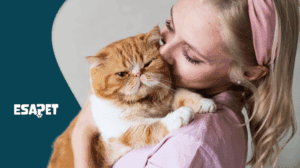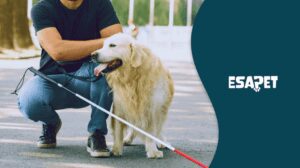Virgin Atlantic Pet Policy: How to Travel with ESAs and PSDs

Flying with your pet, especially pets with an Emotional Support Animal (ESA) or Psychiatric Service Dog (PSD), can be stressful. But, getting your pet with a handle on the airline rules ahead of time can help smooth things out.
Planning to fly Virgin Atlantic? The good news is this British airline owned by Sir Richard Branson welcomes ESAs and PSDs in the cabin but with some rules.
This guide will break down everything you need to know about flying with ESAs and PSDs on Virgin Atlantic pet policy, from rules and regulations to required paperwork.
We’ll cover everything to ensure a stress-free journey for you, your assistance dog, and your furry friend.
Virgin Atlantic Travel Rules
Flying with pets on Virgin Atlantic needs a bit of planning, but don’t worry, it’s all about making sure everyone, including your furry friends, has a safe and comfy trip.
If you’re bringing an Emotional Support Animal (ESA) or a Psychiatric Service Dog (PSD) along, here’s the scoop: they can stay right by your side in the aircraft cabin, thanks to the airline following the Air Carrier Access Act (ACAA) guidelines.
Plus, your ESA or PSD should be trained to behave properly during the flight so everyone can have a pleasant journey. Keep in mind that Virgin Atlantic has specific breed restrictions, stay tuned we will cover those later on in the article.
TLDR |
Virgin Atlantic requires pet booking through Cargo, necessitates up-to-date health documentation, and restricts certain breeds for safety. |
Virgin Atlantic Fees for Pet Travel
The cost of traveling with pets on Virgin Atlantic varies depending on the type of pet travel that you have. Pet ESAs and pet PSDs can get pet travel in for free, provided they meet the airline’s specific requirements.
For pets outside these categories, such as cats traveling alone or with other pets besides dogs, there’s a pet fee. The fee amount isn’t publicly disclosed and varies based on the size of your pet’s carrier.
Virgin Atlantic Standards for ESAs and Service Animals
Virgin Atlantic cares about keeping emotional support animals (ESAs) and service animals safe and comfy, just like everyone else on the flight.
First off, all ESAs and service animals need to behave well, stay calm, and not get aggressive or cause trouble. Travelers should bring all the important papers, like a PSD or ESA letter, shot records, and a vet’s note saying the animal is healthy enough to fly.
If your pet needs to fly in the cargo area, their carrier has to be big enough (71L x 52W x 54H cms) so they can move around comfortably. The carrier should be non collapsible, made from wood or hard plastic, lock securely, and have vents all around, plus a no-leak bottom and a water dish.
Also, Virgin Atlantic doesn’t allow certain breeds of assistance dogs in aircraft cabins, especially those with snub noses due to health risks or dogs that are known to be dangerous assistance dogs or dog or dogs act as under the UK Dangerous Assistance Dog and dogs Act.
Virgin Atlantic and the ACAA
Virgin Atlantic makes sure passengers with disabilities and their service animals are treated right, sticking to what the Air Carrier Access Act (ACAA) says.
This law is all about stopping the unfair treatment of people with disabilities when they fly and making sure airlines help them out as needed.
If you have a service animal, like a PSD or an ESA, they get to fly with you in the cabin at no extra cost because of the ACAA rules.
Breed Restrictions on Virgin Atlantic
Virgin Atlantic operates several flights with specific pet breed restrictions to ensure the safety and comfort of all its passengers and pets. Here’s a quick rundown of flights the airline and breeds of dogs that pets are not permitted to fly on:
- Snub-nosed Dogs and Cats: Breeds like Pekingese, various Pug breeds, and Shih Tzu are not accepted due to their breathing difficulties, which the stress and conditions of flying can exacerbate.
- Specific Dog Breeds: Strong and muscular assistance dog breeds such as Boerboel, Bully Kutta, Bull Terriers, and Staffordshire Bull Terriers are also restricted on Virgin Atlantic flights.
- Cross-breeds: If your furry friend is a cross-breed involving any snub-nosed breed, they might still be accepted. It’s essential to confirm with Virgin Atlantic as exceptions are based on the predominant characteristics of the cross-breed.
- Local Regulations: In destinations like St Lucia, the carriage of Bull Terriers and Staffordshire Bull Terriers is prohibited due to local laws.
Allowed Dog Breeds in Cabin
Some dog breeds accepted are:
- Labrador Retriever
- Golden Retriever
- German Shepherd
- Bulldog (except for English Bulldogs)
- Boxer
Allowed Cat Breeds in the Cabin
Virgin Atlantic will now also accept cats. Only dogs and certain cat breeds will be accepted, such as:
- Siamese
- Persian
- Maine Coon
- Ragdoll
- British Shorthair
Please be aware that the pets and pet breeds mentioned above are not the only ones accepted. While cats and dogs are allowed, other factors such as the size and behavior of the pet or individual animal may also be taken into consideration.
Virgin Atlantic ESA Requirements
Planning to travel with an Emotional Support Animal (ESA) on Virgin Atlantic? You must meet certain requirements to ensure the safety and well-being of all passengers on board. Here are some key points to keep in mind:
Allowances
- ESAs are allowed in the cabin of Virgin Atlantic flights.
- ESAs must be properly confined to a carrier or kennel that meets Virgin Atlantic’s guidelines.
- The animal should be well-behaved and not display aggressive or disruptive behavior.
- ESAs must be accompanied by a valid ESA letter, which a licensed mental health professional issues.
Restrictions
- ESAs are not permitted to travel in the cargo hold. They must remain in the cabin with their owners at all times.
- ESAs must comply with all health and vaccination requirements set forth by Virgin Atlantic and the destination country.
- Your ESA should have a valid ESA letter from a certified mental health professional.
- Virgin Atlantic does not accept certain breeds of animals as ESAs.
Virgin Atlantic Guidelines for ESAs and Service Animals
When traveling with an ESA or service animal on Virgin Atlantic, it is important to follow certain guidelines to ensure a smooth and hassle-free journey. Here are some key guidelines to keep in mind:
- ESAs and service animals must be well-behaved and under control at all times.
- They should not occupy a seat or obstruct any emergency exits or aisles.
- It is recommended to bring essential supplies for your ESA or service animal, such as food, water, and any necessary medications.
- Passengers traveling with ESAs or service animals may be required to present the necessary documentation, including a valid ESA letter or PSD letter, as well as any other required paperwork.
Required Forms and Documents for ESAs
When traveling with an Emotional Support Animal (ESA) on Virgin Atlantic, certain forms and documents are required to ensure compliance with airline policies. Here are the key documents you will need:
- ESA Letter or PSD Letter: To travel with an ESA, you will need a valid ESA letter or PSD letter. A licensed mental health professional must issue this letter and should state that you have a legitimate need for an ESA or PSD.
- Behavior Form: They may require passengers traveling with ESAs to complete a behavior form. This form provides information about the animal’s behavior. It ensures that it will not pose a risk to other passengers or the flight crew.
- Health Form: It is important to ensure your ESA is healthy before traveling. They may require passengers to provide a health form or certificate from a veterinarian stating that the animal is fit to travel.
Getting an Official ESA Letter and Additional Documentation
You will need an official ESA letter to travel with an Emotional Support Animal (ESA) on Virgin Atlantic. This letter proves that you need an ESA and allows you to travel with your animal in the cabin. Here are the steps to obtain an official ESA letter:
- Find a Licensed Mental Health Professional: Start by finding a licensed mental health professional who is qualified to assess your need for an ESA. This can be a psychiatrist, psychologist, therapist, or counselor.
- Schedule a Consultation: Once you have found a licensed mental health professional, schedule a consultation to discuss your need for an ESA. During this consultation, be prepared to provide information about your mental health condition and how an ESA can help alleviate your symptoms.
- Obtain the ESA Letter: If the licensed mental health professional determines that you have a legitimate need for an ESA, they will provide you with an official ESA letter. This letter should be on the mental health professional’s letterhead and include their contact information, the date of issuance, and a statement that you have a disability and require the assistance of an ESA.
Get your Official ESA Letter Consultation from a licensed therapist.
Get ESA Letter Now
In addition to the ESA letter, you may also need to provide other documentation such as vaccination records and a health certificate from a veterinarian. It is important to check with Virgin Atlantic for their specific requirements.
Prepping the ESA for Traveling
Traveling with an Emotional Support Animal (ESA) can be an exciting and rewarding experience. However, it is important to properly prepare your ESA for the journey to ensure their comfort and well-being. Here are some tips to help you and your ESA have a smooth and enjoyable travel experience:
Manners Training
Before traveling, ensuring that your ESA is well-behaved and obedient is important. Consider enrolling your ESA in manners training or obedience classes to help them adapt to different environments and situations. This will help prevent any disruptive behavior during the flight.
Make Sure They Can Hold It
During a flight, providing your ESA with immediate access to a bathroom may not always be possible. Ensure your ESA is properly trained to hold their bladder and bowels for an extended period. This will help prevent any accidents or discomfort during the flight.
Check International Laws
If you are traveling internationally with your ESA, it is important to check the laws and regulations of your destination country. Some countries may have specific requirements or restrictions for traveling with ESAs. It is important to comply with these laws to avoid any issues or complications during your trip.
Wrapping Up Virgin Atlantic Policy
Given the detailed guidelines we’ve shared, navigating the skies with Virgin Atlantic alongside your Emotional Support Animal (ESA) or Psychiatric Service Dog (PSD) should be a breeze.
The secret to a worry-free flight lies in familiarizing yourself with Virgin Atlantic’s comprehensive pet policies, which cover everything from carrier specifications to necessary health documents. Adhering to these rules ensures compliance and promises a smooth voyage for you and your furry friend.
Before you pack those bags, double-check the latest on Virgin Atlantic’s pet policy to keep your travel plans flying high. Here’s to a sky-high adventure with your assistance dog or cat companion by your side!





